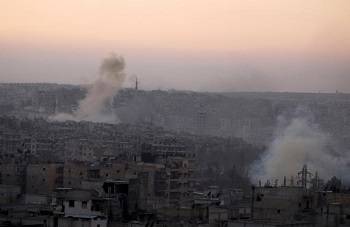In a statement published on Sunday, as Syrian regime forces pressed on with their offensive against opposition fighters in the city, the Russians said the French text was "politicized and one-sided".
The UN Security Council voted on Saturday on two rival resolutions on the fighting - one drafted by France calling for an end to air strikes and a second by Russia that urged a ceasefire but made no mention of halting the bombings.
Russia's text was effectively the French draft with Russian amendments.
It removed the demand for an end to air strikes on Aleppo and put the focus back on a failed US - Russia ceasefire deal, which was annexed to the draft.
Russia vetoed the French-drafted resolution while the Russian draft failed to gather enough votes to pass.
Matthew Rycroft, Britain's ambassador to the UN, described Saturday's failure in New York as "a bad day for Russia, but an even worse day for the people of Aleppo".
"Russia has become one of the chief purveyors of terror in Aleppo, using tactics more commonly associated with thugs than governments," David Pressman, US deputy ambassador to the UN, told the council.
He said Russia was "intent on allowing the killing to continue and, indeed, participating in carrying it out" and that what was needed from Moscow was "less talk and more action from them to stop the slaughter".
'Theatrical mess'
A UN resolution needs nine votes in favor and no vetoes to be adopted. The veto powers are the US, France, Britain, Russia and China.
The French draft received 11 votes in favor, while China and Angola abstained. Venezuela joined Russia in voting against it.
The Russian text only received four votes in favor, so a veto was not needed to block it.
Russia only gained the support of China, Venezuela and Egypt for its draft resolution.
Angola and Uruguay abstained, while the remaining nine council members voted against.
Egypt was the only Security Council member to vote for both the French and the Russian plans.
It drew criticism from Saudi Arabia and Qatar for its apparent support of Moscow's proposal.
Abdullah al-Alami, Saudi Arabia's representative for the UN, said on Saturday "it was very painful that Senegal and Malaysia were closer to the Arab consensus on Syria, compared to that of Egypt, which is supposed to be the Arab representative to the Security Council.
"The counter proposal by Russia was a theatrical mess.
"Today is a dark day for Syria, but the Syrian people won't give up, they will prevail against the odds."
Qatar too expressed disappointment over Egypt's vote with Russia, and said it will push ahead with plans to address the humanitarian situation on the ground in Syria.
"We were disappointed when Egypt voted for the Russian proposal," Alya bint Ahmed bin Saif Al Thani, Qatar's ambassador to the UN, told Al Jazeera on Saturday.
"It's important now to focus on what we can do after the failure of the Security Council - this is the fifth veto by Russia concerning Syria.
"We will now work with the countries that are friends with the Syrian people to look at what the options are."
Al Jazeera's Diplomatic Editor James Bays, reporting from the UN headquarters in New York City, said there are only a few diplomatic options left to halt the suffering of the Syrian people.
"The International Syria Support Group, all the key international and regional players have got nowhere," he said.
"Then there were efforts by the US and Russia. They're now not talking to each other. And the last-ditch option was trying to get the Security Council to take a lead - they've now hit a road block."
"There is one final initiative led by Security Council member New Zealand that may succeed in securing a ceasefire in Aleppo in the coming days.
"New Zeland's ambassador Gerard van Bohemen already has its own draft text and he’s consulting with other countries to get a last-minute effort to get agreement around the Security Council table."
'Decisive land offensive'
Meanwhile, on the ground, Syrian regime forces have kept up their assault on opposition-held eastern Aleppo on Sunday.
The soldiers and their allies were advancing on Sunday street by street in the eastern sector, which has been out of regime hands since 2012.
The regime army launched its assault on the besieged sector of Aleppo more than two weeks ago with the backing of Russian air strikes, aiming to reunite the city which was Syria's economic hub before its war erupted in 2011.
According to the SOHR, air strikes by the regime and its Russian ally have claimed 273 lives, mostly civilians and including 53 children, since the September 22 launch of operations to reunite the regime-held west and the east of Aleppo.
The assault on Aleppo was launched just days after the collapse of a ceasefire in Syria that was brokered jointly by Russia and the US.
Frank-Walter Steinmeier, German foreign minister, warned that the mounting tensions between the US and Russia over the Syrian conflict had created a situation "more dangerous" than the Cold War.
"It's a fallacy to think that this is like the Cold War," he said in an interview published by Bild newspaper. "The current times are different and more dangerous."
PHOTO CAPTION
Smoke rises from Bustan al-Basha neighborhood of Aleppo, Syria, October 5, 2016. REUTERS
Al-Jazeera


 Home
Home Discover Islam
Discover Islam Quran Recitations
Quran Recitations Lectures
Lectures
 Fatwa
Fatwa Articles
Articles Fiqh
Fiqh E-Books
E-Books Boys & Girls
Boys & Girls  Ramadan
Ramadan Fatwa Audios
Fatwa Audios Month of Mercy
Month of Mercy Women
Women Eed Al- Fitr
Eed Al- Fitr Food Recipes
Food Recipes Videos
Videos

 Prayer Times
Prayer Times












